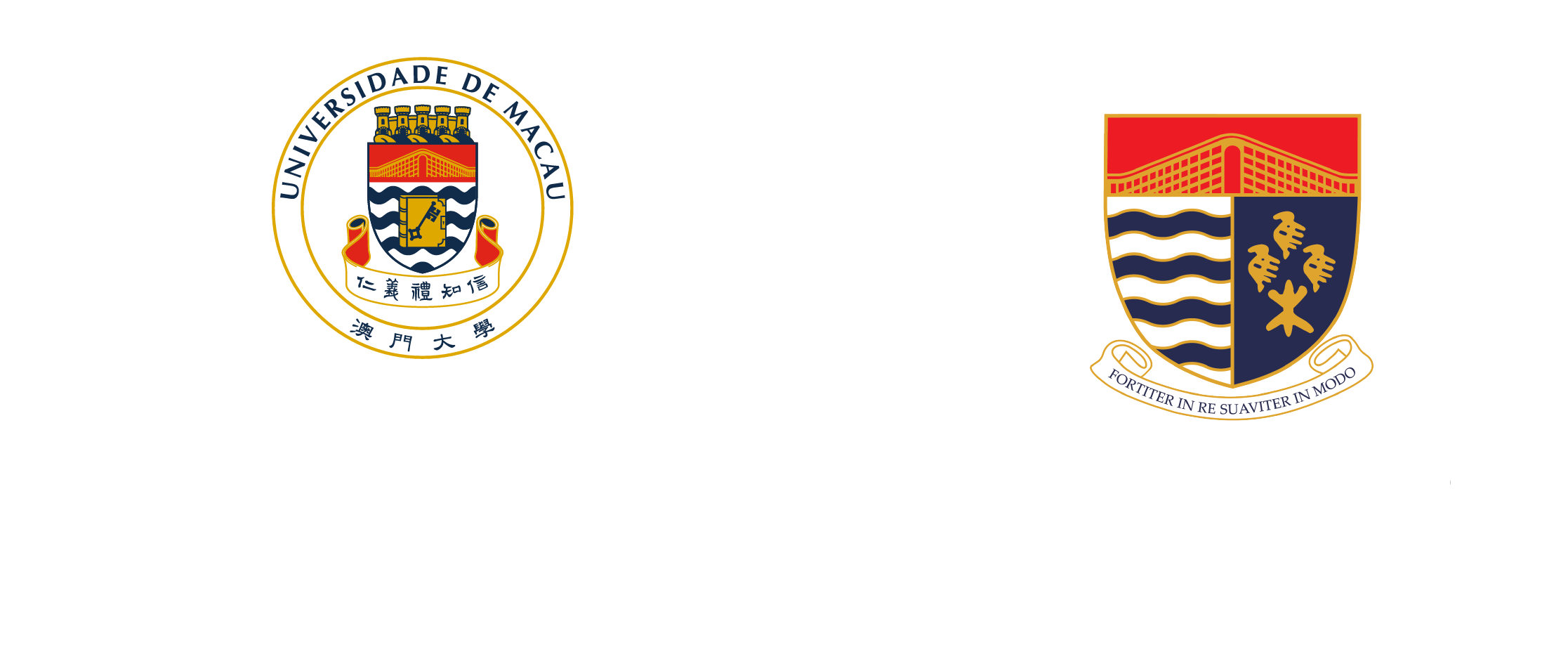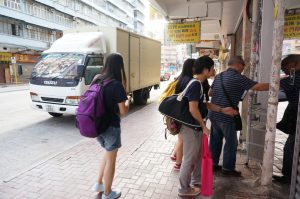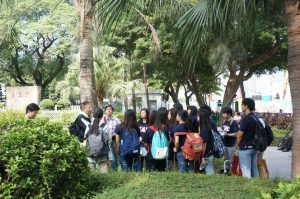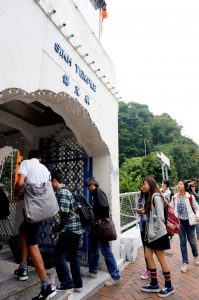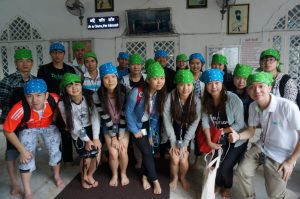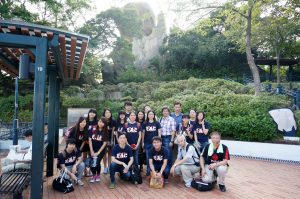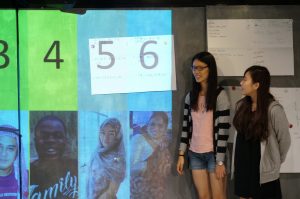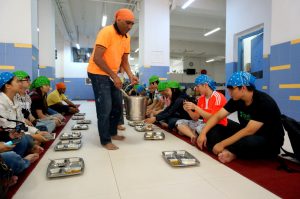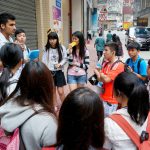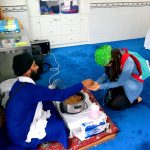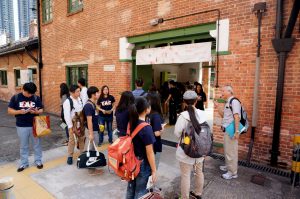
Students listened carefully to docent Uncle Paul’s detail introduction about Cattle Depot Artist Village.
同學們細心聆聽導賞員波叔對牛棚藝術村的詳細介紹。
On 2nd and 3rd November, 2014, Stanley Ho East Asia College organized a trip to Hong Kong for community visits. Resident Fellows Dr. Sancia Wan and Dr. Kevin Huang, and College Fellow Dr. Angus Lam (Assistant Professor at the Faculty of Science and Technology) led a group of 15 students from different years of study and disciplines to observe and understand, through field visits, interviews and workshops, how various vulnerable groups live their lives in such a fast-growing city as Hong Kong. This trip aimed at helping students reflect upon certain social problems, including poverty, housing, community development, discrimination, identity and ethnic minorities.
The first day comprised three major activities: (1) a tour guided by Hoi Bun Heritage Docents Society in the To Kwa Wan community; (2) home visits to families of low socio-economic status arranged by To Kwa Wan South Community Service Office of Kowloon City Resident Association; (3) drama “If One Day We Can’t See” produced by Shek Kip Mei Lutheran Centre for the Blind of Hong Kong Lutheran Social Service at JCCAC Black Box Theatre.
With the guidance of Mr. Paul Ng and Mr. C. P. Chow, the group of 18 participants visited a number of local spots, including Sacred Hill, Cattle Depot Artist Village, Hoi Sum Park, and so on. Some students said that, with Hong Kong’s present urbanization, it was difficult to imagine the past scene of the city. According to docent Paul, “The historic square wells recently excavated are located within the site of To Kwa Wan Station of the MTR Shatin to Central Line. Many people think that if the train route has to be moved, it will greatly increase the financial overruns. Therefore, they don’t want diversion, nor complete shutdown of the construction site to give way for the archaeological work. So the historical relics are likely to be destroyed.” Mr. Chow focused on the industrial development in Hong Kong: To Kwa Wan originally had a lot of industries producing firecrackers, soda, coal, and so on. There was even a cattle slaughterhouse. With the development of the city, however, we now see hotels, high-rises, museums and parks instead of factories in the area.
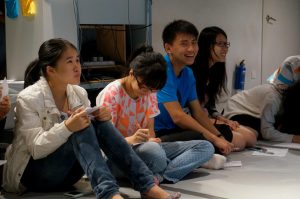
Students had a relaxing discussion about identity issues at the Oxfam workshop.
同學們在樂施會工作坊輕鬆的討論關於身份認同問題。
In the late afternoon, the group was divided into four teams, under the assistance of volunteers of the community service office, to visit some low socio-economic status families. Some students felt surprised that many residents in the name list were either not at home or no longer living in the properties in the list. Volunteer Mr. Cik explained, “Tenants here are highly mobile and need to go out to work. Many are from different countries. All these result in little interaction between neighbors.” During the two-hour period, each group successfully visited 3-4 families, and gained some understanding of their living circumstances.
In the evening, the group arrived at the Jockey Club Creative Arts Centre (JCCAC) Black Box Theatre to appreciate a drama entitled “If One Day We Can’t See” co-starring visually-impaired and sighted actors. This drama was adapted from true stories of the visually impaired, showing the unjust circumstances facing people of two generations who suffered from partial or complete loss of vision. The remarkable interpretation of actors and the touching plots caused many audience to weep. The director hoped that more people would become concerned about these vulnerable groups in society, so that their world which already lost light would not become even colder.
On the second day, the group went to the Interactive Education Center of Oxfam Hong Kong in North Point to join the multicultural workshops entitled “Who are You” and “A Journey to Discover Ethnic Minorities” co-organized by Oxfam and WEDO GLOBAL. Mr. Bosco Ng of WEDO GLOBAL said, “In the context of globalization, more and more people migrated to and integrated into foreign countries. Although their religious beliefs seldom change, it is difficult to know their nationalities and occupations based on appearance and other subjective factors. So, when we first meet someone, we ought to avoid judging one’s identity based on stereotyped ideas.” Bosco continued to elaborate on discrimination issues to the participants, “Due to different cultures, people of ethnic minorities and with disabilities are easily excluded from the mainstream communities and become marginalized.”
After the workshop, the group had a guided tour in Khalsa Diwan Sikh Temple in Wan Chai, led by a university student volunteer who is Sikh Indian. Talking in Cantonese, the student docent explained Sikhism’s origin, principles, customs, and so on. The participants also tried some staple food commonly eaten by Sikhs. Some students said it was their first time to put plates with food on the floor. Food provided at the temple is free for anyone who comes in, regardless of ethnicity and religion, and mainly comprises vegetables in order to be inclusive of Islam and other religions. The ingredients are donated by Sikhs and even the general public. Curry is the featured dish. Students expressed that this experience was very special, as they had never thought that there would be such a place with unique religious characteristics right at the heart of urban Hong Kong.
Upon completion of the journey, students shared that this trip was very fruitful, as they learned the living conditions and difficulties of different vulnerable groups in such a highly developed city. They hoped that the College would organize more similar visits to different communities in the future, so as to allow them to personally observe people’s lives in different parts of the world, and to achieve the goals of experiential learning.
By Cai Wenhao, Chinese Language and Literature Year 3 Student (Chinese)
走訪香港本地社區之旅
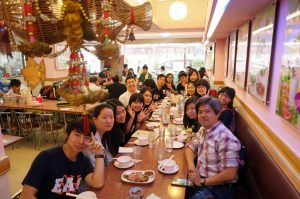
The group kicked off their journey with lunch at a Thai restaurant upon their arrival.
抵達後,團隊在一間泰國餐廳享用午餐以拉開他們這個旅程的序幕。
2014年11月2至3號,何鴻燊東亞書院一行15位同學在書院導師溫慧珊博士、黃才試博士及Fellow林智超博士(科技學院助理教授)帶領下走訪香港本地社區,通過實地考察、接觸社區和個案訪談,了解到弱勢群體如何在如香港此類快速發展的城市生活,繁榮背後貧富懸殊的矛盾,反思自己和他人是如何看待有關貧困住房和少數族裔的社會問題。第一天主要包括三個活動:一為由海濱文化導賞會帶領的土瓜灣社區導賞遊;二為由九龍城區居民聯會土瓜灣南社區服務處總幹事所組織的香港低社經階層家庭拜訪;以及由香港路德會社會服務處路德會石硤尾失明者中心主辦的黑盒劇場話劇《看不到的世界》。
當日吃過午飯後,書院一行18人在海濱文化導賞會的波叔和周先生帶領下參觀宋皇臺、牛棚藝術村、海心公園等。有同學表示現在香港的高度城市化發展已經難以想像到當時的情況。波叔認為:「最近挖崛出土的方井剛好位於香港沙中線土瓜灣站地盤,不少人認為鐵路改道會大大使財政超支的問題惡化,故不希望改道,也不能完全停工讓路予考古工作。所以歷史文物很有可能會被破壞。」接著周先生主要講述香港工業發展的問題,土瓜灣原本發展炮竹、汽水、煤炭等等的工業以及一座屠牛房。但隨著香港的社會發展,現在所看到的酒店、高樓大廈、博物館和公園等皆代替了原有的煤炭、燈泡等工業。
於四點半左右大隊分成四小組,在社區服務處義工引領下拜訪區內低社經階層家庭,當日下午很多被訪名單上的住客不是不在其家中,就是已經搬走。義工戚先生表示:「這裡的住客流動性快,經常需要外出打工,加上不同國家的人居住,導致鄰舍都很少來往。」在兩小時內,各組成功探訪了三至四個住戶,並基本了解到他們的生活情況。
晚上,大隊到達賽馬會創意藝術中心黑盒劇場欣賞了由視障及健視演員合作的話劇《看不到的世界》。此劇改編自視障人士的真實故事,展現兩代視力喪失或有限的人士在社會中受到的不公平待遇。臺上的演員都用心演繹,感人情節讓不少觀眾紛紛落淚。導演表示「希望更多的人可以關愛這些弱勢社群,不希望再讓他們原本看不到光的世界更加冷落。」
第二天,書院大隊乘坐地鐵到位於北角的樂施會互動教育中心。參與由樂施會與愛同行(WEDO GLOBAL)合辦的「你是誰」和「少數族裔發現之旅」多元文化工作坊。愛同行工作人員Bosco給予幾張照片讓同學們猜測他們的國籍、職業和信仰等等。同學們表示自己的答案大都是根據樣貌、衣服、膚色推測的。Bosco表示:「在全球化下,更多外來民族融入社會,雖然他們信仰部份很少改變,但很難根據外貌等主觀條件得知其國籍與職業。所以在與人初次見面時,切忌單憑陳規概念判斷一個人的身份價值。」關於社會的歧視問題,他表示「因為民族文化與主流社群不相同,故少數族裔、殘疾人士等被排擠,成為了邊緣或是弱勢社群。」工作坊後,大家一同前往灣仔進行地區導賞,由印度裔的大學生義工帶領參觀錫克廟,並用粵語詳細講解錫克教的起源、教義、習俗等。最後讓同學們品嚐錫克教徒主要的食物。有些同學表示第一次嘗試把食物放在地板上。錫克廟為包容伊斯蘭教等不同宗教,所以食物都為蔬果類。食材等主要由教徒等人士貢獻,食物主要是富有民族特色的咖喱。同學們均表示這次體驗非常特別,之前未有想過在香港稠密市區內會有這類富有宗教特色的地方。
整個行程後,同學們都認為今次收穫甚豐,可以體會到不同的弱勢群體在一個發達城市的境遇和困難。他們期望書院可以在未來組織更多走訪不同社區類似的出行活動,讓學生實地考察在世界不同地方的人的生活,達到體驗式學習的目標。
撰寫:中國語言及文學三年級學生 蔡文豪 (中文)
- A Cantonese-speaking Indian student volunteer served as the docent of the community tour in Wan Chai.
- 書院師生們在海心公園的魚尾石之下留下了足跡。
- 其中一個分隊走進一幢唐樓開始家訪。
- 同學們在樂施會工作坊輕鬆的討論關於身份認同問題。

